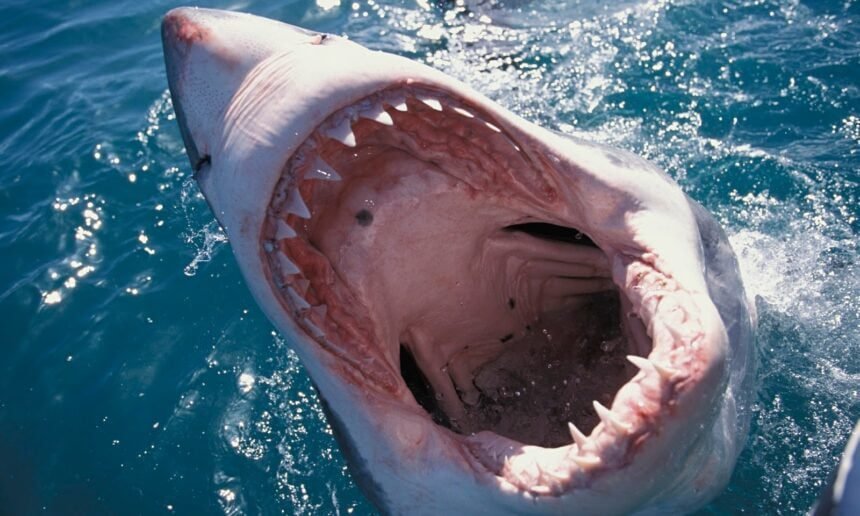Learn about the rise in fatal shark attacks and bites last year. Surfers were the primary targets. Stay informed to stay safe.
According to the International Shark Attack File of the University of Florida, last year saw an increase in shark bites and fatal shark attacks worldwide.
Last year, 69 unprovoked shark bites were reported, which is more than six above the five-year average, with the notification of a shark attack filed, which conducts global research on shark bites.
Guy Naylor, the Director of the Shark Research Program at the Florida Museum of Natural History, said that shark bites are still within normal limits. However, fatalities “this year are quite concerning.”
Last year, there were 14 confirmed shark-related fatalities worldwide, with 10 classified as unprovoked, doubling from the previous year. Two of them were in the United States.
As always, the United States led with 36 unprovoked bites. Although there were relatively fewer bites in Florida at 16, the state still led the nation in shark bites, owing to its expanded coastline and tourism industry, making it never short of surprises.
Where were the fatal shark attacks?
One in California and another in Hawaii in the United States. One each confirmed in the Bahamas, Egypt, Mexico, and New Caledonia. In Australia, 40% of the deaths were reported out of 10. Of the four individuals who died in shark attacks in Australia, three were surfers, and all three deaths occurred at a popular surfing location, Ayers Rock, off the coast of South Australia, known for its rugged coastline and surf breaks.
What is a fatal shark attack?
A fatal shark attack occurs when a shark encounters either intentionally or unintentionally with a person. The Shark Attack File records 22 attacks that occurred last year.
Where were the other shark attacks?
Of the 36 attacks in the United States, approximately 52% occurred worldwide.
In Florida, eight occurred in Volusia County, home to Daytona Beach and New Smyrna Beach, long dubbed the “shark bite capital of the world.” This area consistently leads in bites, although local surfers jest that most bites are just “nibbles.”
Elsewhere in Florida counties, two each occurred in Brevard and St. Lucie, and one each in Miami-Dade, Palm Beach, Escambia, and Pinellas.
Besides fatalities in Hawaii, there were seven other bites. Three in North Carolina, two in South Carolina, and two in California, including fatalities.
Four occurred in New York, including one in New York City. Naylor attributes this activity to improving water quality and increasing fish populations. “It’s very concerning, but the fact is you’re putting a lot of people in the water with fish on hot days,” he said. A bite was reported in New Jersey.
Elsewhere, bites were reported in Costa Rica, Colombia, Brazil, New Zealand, Seychelles, Turkey, the Cocos Islands of Ecuador, and South Africa.
Why so many bites in Australia?
Fifteen bites were reported in Australia, including four fatalities. Naylor speculated that the attacks are partially because the country has taken action to protect its beaches and sharks.
The seal population is thriving. “More seals, more white sharks. And if they congregate near areas where there are lots of white sharks, you know you’re near good surf breaks. You look a little like a seal,” he said.
Remembering the “Jaws” Effect
Researchers noted a gradual increase in shark bites since the implementation of “Jaws.” But it’s not due to aggression from the sharks, they say. Rather, it’s a combination of more people in the water, reporting of bites, and fatalities.
Books and films have also spawned a generation of shark scientists, Naylor wrote in an article for The Conversation.
“Shark research came into the mainstream quickly after ‘Jaws,'” Naylor wrote. “The American Elasmobranch Society was founded in 1982. Graduate students stood in line to study shark behaviour, and the number of published studies on sharks increased rapidly.”
How can you avoid shark bites?
Programs to prevent shark attacks have shown that you are more likely to win the lottery than encounter a shark bite, but if you’re going into the water, here are a few tips to keep in mind:
Stay out of the water after dusk or before dawn. Wear brightly coloured swimwear and jewellery. Swim near a lifeguard and stay close to the shore. Watch for diving seabirds or jumping fish, as they could indicate the presence of sharks in the area. If you’re in Australia, try your best not to look like a seal.
Read More: Albino Great White Shark Birth Captured for the First Time









Thanks for sharing. I read many of your blog posts, cool, your blog is very good.